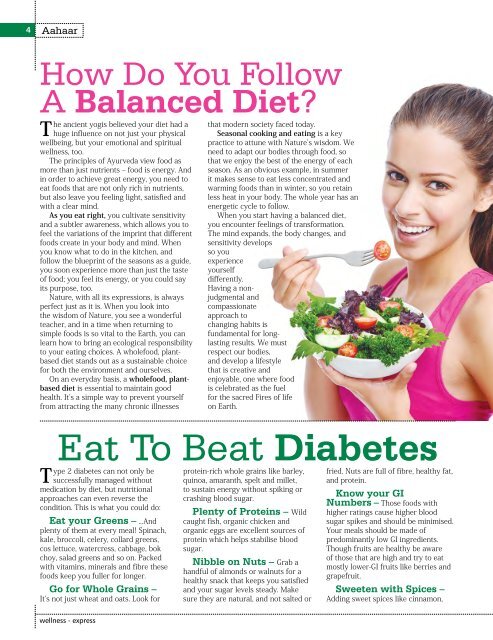Matters express_16+4 pages
Create successful ePaper yourself
Turn your PDF publications into a flip-book with our unique Google optimized e-Paper software.
4<br />
Aahaar<br />
Aahaar 5<br />
How Do You Follow<br />
A Balanced Diet?<br />
The ancient yogis believed your diet had a that modern society faced today.<br />
huge influence on not just your physical Seasonal cooking and eating is a key<br />
wellbeing, but your emotional and spiritual practice to attune with Nature’s wisdom. We<br />
wellness, too.<br />
need to adapt our bodies through food, so<br />
The principles of Ayurveda view food as that we enjoy the best of the energy of each<br />
more than just nutrients – food is energy. And season. As an obvious example, in summer<br />
in order to achieve great energy, you need to it makes sense to eat less concentrated and<br />
eat foods that are not only rich in nutrients, warming foods than in winter, so you retain<br />
but also leave you feeling light, satisfied and less heat in your body. The whole year has an<br />
with a clear mind.<br />
energetic cycle to follow.<br />
As you eat right, you cultivate sensitivity When you start having a balanced diet,<br />
and a subtler awareness, which allows you to you encounter feelings of transformation.<br />
feel the variations of the imprint that different The mind expands, the body changes, and<br />
foods create in your body and mind. When sensitivity develops<br />
you know what to do in the kitchen, and so you<br />
follow the blueprint of the seasons as a guide, experience<br />
you soon experience more than just the taste yourself<br />
of food; you feel its energy, or you could say differently.<br />
its purpose, too.<br />
Having a nonjudgmental<br />
and<br />
Nature, with all its <strong>express</strong>ions, is always<br />
perfect just as it is. When you look into<br />
compassionate<br />
the wisdom of Nature, you see a wonderful approach to<br />
teacher, and in a time when returning to changing habits is<br />
simple foods is so vital to the Earth, you can fundamental for longlasting<br />
results. We must<br />
learn how to bring an ecological responsibility<br />
to your eating choices. A wholefood, plantbased<br />
diet stands out as a sustainable choice and develop a lifestyle<br />
respect our bodies,<br />
for both the environment and ourselves. that is creative and<br />
On an everyday basis, a wholefood, plantbased<br />
diet is essential to maintain good is celebrated as the fuel<br />
enjoyable, one where food<br />
health. It’s a simple way to prevent yourself for the sacred Fires of life<br />
from attracting the many chronic illnesses on Earth.<br />
Eat To Beat Diabetes<br />
Type 2 diabetes can not only be<br />
successfully managed without<br />
medication by diet, but nutritional<br />
approaches can even reverse the<br />
condition. This is what you could do:<br />
Eat your Greens – ...And<br />
plenty of them at every meal! Spinach,<br />
kale, broccoli, celery, collard greens,<br />
cos lettuce, watercress, cabbage, bok<br />
choy, salad greens and so on. Packed<br />
with vitamins, minerals and fibre these<br />
foods keep you fuller for longer.<br />
Go for Whole Grains –<br />
It’s not just wheat and oats. Look for<br />
protein-rich whole grains like barley,<br />
quinoa, amaranth, spelt and millet,<br />
to sustain energy without spiking or<br />
crashing blood sugar.<br />
Plenty of Proteins – Wild<br />
caught fish, organic chicken and<br />
organic eggs are excellent sources of<br />
protein which helps stabilise blood<br />
sugar.<br />
Nibble on Nuts – Grab a<br />
handful of almonds or walnuts for a<br />
healthy snack that keeps you satisfied<br />
and your sugar levels steady. Make<br />
sure they are natural, and not salted or<br />
fried. Nuts are full of fibre, healthy fat,<br />
and protein.<br />
Know your GI<br />
Numbers – Those foods with<br />
higher ratings cause higher blood<br />
sugar spikes and should be minimised.<br />
Your meals should be made of<br />
predominantly low GI ingredients.<br />
Though fruits are healthy be aware<br />
of those that are high and try to eat<br />
mostly lower-GI fruits like berries and<br />
grapefruit.<br />
Sweeten with Spices –<br />
Adding sweet spices like cinnamon,<br />
cardamom, nutmeg, all spice, cloves<br />
and ginger to dishes adds natural<br />
sweetness. Cinnamon is well known<br />
to help control sugar cravings and<br />
has long been used for this purpose in<br />
natural medicine like Ayurveda.<br />
Remove Refined Sugar –<br />
Check food labels for hidden sugars<br />
like dextrose, dextrin, high fructose<br />
corn syrup, fructose, lactose, maltose<br />
and glucose.<br />
Purge Processed<br />
Carbohydrates – ‘White’<br />
processed foods like pasta, rice,<br />
bread, biscuits, cakes, crackers have<br />
been stripped of their nutritious<br />
components and quickly elevate blood<br />
sugars. Look out for the whole grain<br />
and alternative options available in<br />
supermarkets nowadays.<br />
Eating regular, smaller meals, five<br />
or six times a day, is the best. Don’t go<br />
more than three hours without having<br />
a small snack. Make sure you always<br />
have healthy snacks on you like a<br />
snack bar, fruit, seeds or nuts in case<br />
your blood sugar drops when out.<br />
Can Your Diet Improve<br />
Heart Health?<br />
Research consistently shows<br />
highly processed foods and excess arteries, they are best avoided. It is<br />
the positive effects of a plantbased<br />
refined sugar can trigger a lowgrade<br />
also important to remember that not<br />
diet on heart health. This<br />
approach has the potential to save<br />
over a quarter of deaths related to<br />
heart-disease as well as improving<br />
your general health and waistline.<br />
Many foods and nutrients have a<br />
tremendous impact on cardiovascular<br />
health such as fibre, healthy fats,<br />
and some types of anthocyanins –<br />
colourful pigments found in<br />
abundance in superfoods.<br />
Plant-based whole foods<br />
have no cholesterol, and<br />
often offer nutrients<br />
that promote blood<br />
circulation and<br />
anti-inflammatory<br />
activity, so lean<br />
on them. The<br />
more fruits,<br />
vegetables, whole<br />
grains, legumes,<br />
nuts and seeds<br />
you consume,<br />
the better. Since<br />
inflammation that contributes<br />
to hardening and furring up of the<br />
all fat is bad – healthy fats like the<br />
essential fatty acids found in chia and<br />
flaxseeds can actually boost<br />
cardiovascular health.<br />
wellness - <strong>express</strong><br />
wellness - <strong>express</strong>
















